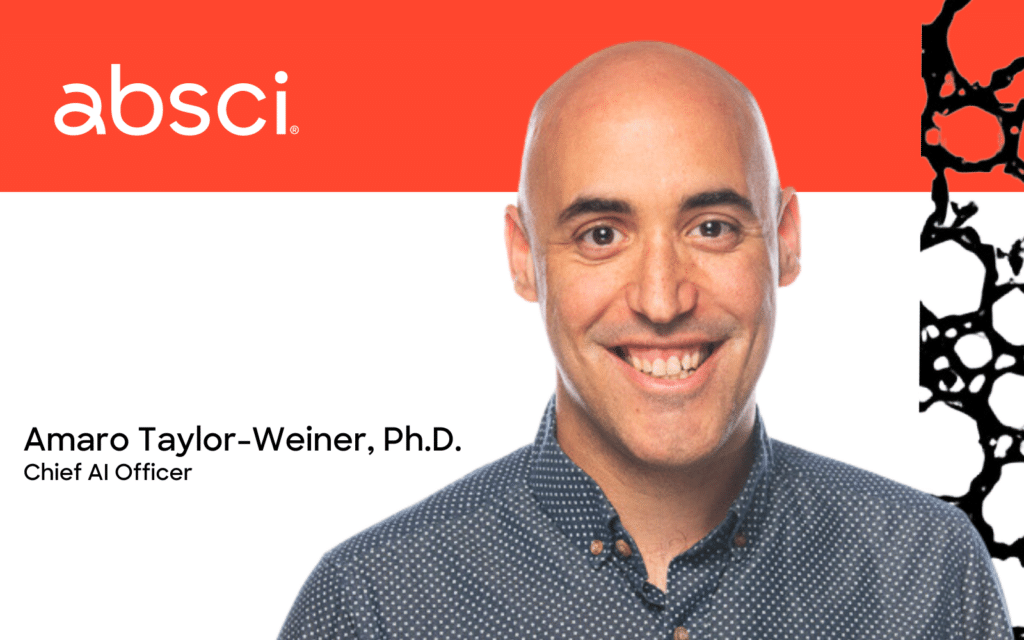Scaling AI to bring antibodies to the clinic
Sep 27, 2023
Absci’s AI leader on wet lab integration, partnering with pharma, and his obsession with patient impact.

Amaro Taylor-Weiner, Ph.D., has been scaling solutions in artificial intelligence, healthcare, and computational medicine for more than a decade – long before ChatGPT brought generative AI into global focus. So too, for more than a decade, Absci has been developing its antibody know-how, which it has applied toward its first-in-class ability to design and validate de novo therapeutic antibodies with zero-shot generative AI.
Now, as Absci begins to advance a portfolio of next-generation therapeutic candidates closer to the clinic, Amaro comes aboard as Absci’s Chief AI Officer to help scale the technology that will create better biologics for patients, faster.
“There are many interesting AI opportunities out there, but Absci stands out as the only company with cutting-edge AI, a scalable and integrated wet lab, and a seasoned drug creation team all under one roof,” says Amaro, who has more than 100 highly-cited peer-reviewed publications to his name. “Absci’s ability to generate massive training and validation data in the lab is what excites me and what I believe will ultimately enable AI to bring better antibody therapeutics to the clinic.”
Amaro’s AI-driven genomics discovery has led to new trials and changes in the standard of care. He has also helped develop new AI diagnostics to enable clinical drug development. Absci will benefit from Amaro’s experience in realizing AI-driven innovation as it accelerates toward bringing AI-designed therapeutic candidates to the clinic.
“There’s nothing more powerful than bringing a new therapeutic to market,” and if AI can increase success and speed drugs to market, Amaro says “that’s improving people’s lives in a deep way.”
The path to AI drug discovery
Amaro began his path to AI drug creation after earning his undergraduate degree in cognitive and brain sciences and taking a computational biology role at the Broad Institute. He says working with leading cancer physicians like Dr. Priscilla Brastianos on pediatric brain tumors was the most humbling, inspiring three years of his early career.
“I could see the amazing impact we were having on patients’ lives, and I caught the bug where I was just like, I have to do this – I’m obsessed with this problem,” he says.
To make a bigger impact, Amaro decided to further his studies, earning his Ph.D. in Biomedical Informatics from Harvard. He then spent the next several years growing teams and codebase in biotech. At PathAI, Amaro and his teams developed AI-powered pathology products to advance drug and diagnostic development. As head of data science at Nabla, Amaro developed novel machine-learning methods for computational antibody design. Now, his sights are set on architecting AI for drug creation.
Architecting AI for drug creation
Killer algorithms are only one ingredient of AI success. To bring useful AI-driven innovation to people, Amaro says there’s a lot of “organizational engineering and culture building” that has to happen for AI and wet lab teams to become a well-oiled machine.
“It’s a very different set of problems than writing code,” Amaro says, requiring scientists to make decisions differently, cut through uncertainty, and adopt bold approaches to innovation. He says Absci is doing this, too, as it systematically applies key AI and wet lab technologies to create a portfolio of antibody drug candidates.
“That’s what really drew me to Absci,” he says. “It has this strong base as a wet lab company and a differentiating data advantage over other AI antibody design companies.”
“Amaro is not only a leading AI scientist, but he also brings strong leadership and organizational skills to the table,” says Andreas Busch, Chief Innovation Officer of Absci. “He’s the right guy at the right time for Absci.”
Bringing biotech and AI closer together for pharma
As Amaro gets underway at Absci, one of his goals is to create a more seamless integration between the biotech and AI teams. He points to an eye-opening experience earlier in his career when he was shadowing a colleague in the lab: “Some of the choices that I made in the code meant this guy had to stand there for 16 hours pipetting,” he says.
Amaro says computational groups and wet lab groups tend to work independently with their own jargon and culture. “It’s a new model for the field to have these groups work together tightly and improve each other’s technology through collaboration. We always need to be asking ourselves how we can build each other up.”
With tighter integration comes the opportunity to break down every part of the design loop to speed our iterative development of antibodies using AI, says Amaro. And that’s good when talking to potential partners about what AI design can bring to the pharmaceutical industry.
“To partner with pharma, you need to be specific about how your technology improves their workflows,” says Amaro. “They’re driven by bringing new drugs to market and making accurate decisions about drug assets and won’t be impressed by new technology unless it’s couched in clear value propositions tied to drugs and patients.”
Amaro’s appointment as Chief AI Officer at Absci is a big move towards creating better biologics for patients faster using AI-driven innovation. His experience in realizing AI innovations will be invaluable to Absci as it advances toward bringing therapeutic candidates to the clinic. By scaling solutions in AI, healthcare, and computational medicine, Amaro is poised to help improve patients’ lives in a deep way.